Screengrabs from some of the more lurid moments in Nicolas Winding Refn’s Valhalla Rising (2009). Having watched Drive (2011) and Refn’s recent Only God Forgives I’ve been backtracking to his earlier films. Valhalla Rising is 90 minutes of apocalyptic doom set among sparring tribes in the northern wilds. There’s little in the way of dialogue or even anything resembling a narrative, the whole thing is a study of mood and character with one-eyed Mads Mikkelesen stomping and slaughtering his way through a series of very violent skirmishes and close encounters. Offhand I can’t think of another film where the central character (and ostensible “star”) doesn’t say a single word. Mikkelesen achieves that here and still manages to be a magnetic presence, more so than in the recent Hannibal TV series which hasn’t impressed me at all.
One of the pleasures of Only God Forgives is its garish visual style. That’s an easy thing to apply to an already garish city like Bangkok but you need some audacity to conjure similar visuals from the natural world as Refn does in Valhalla Rising. There’s less of this than I expected from reviews of the film—I’d have been happy with a lot more—but it’s a promising development. That this is easy to create in post-production yet is still a rare thing in feature films says much about the lack of visual imagination in the current crop of directors. If you’re sympathetic to Refn’s brooding manner then Valhalla Rising is worth a look.

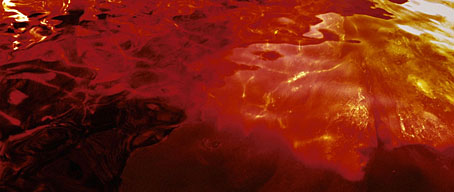
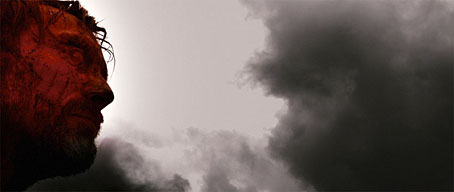
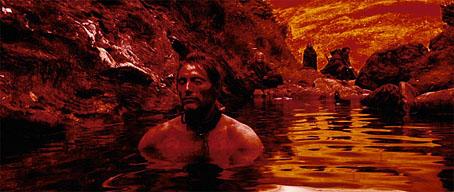
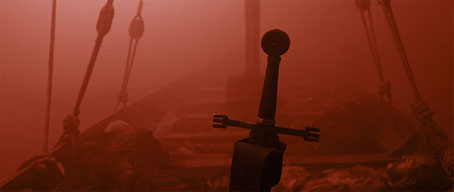
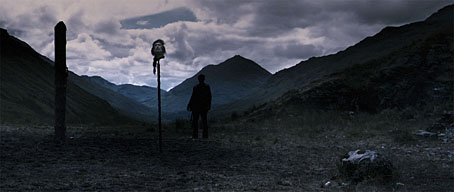
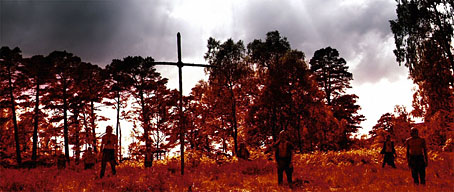
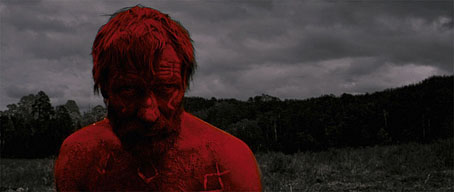


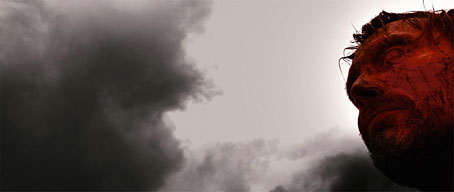
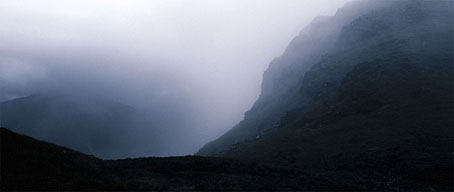
Despite it’s savaging by the majority of critics, I quite enjoyed Only God Forgives. Refn may have flaws as a filmmaker but he’s a master stylist, and certainly never dull.
Never dull is absolutely right, and he achieves that without going the hyperactive route.
I don’t pay much attention to film critics. There’s a couple I trust, the rest I ignore, preferring to make up my own mind. Blade Runner was mauled by critics when it appeared, now it’s held up as a modern classic. Posterity tends to favour the audacious, not those who play it safe.
John, you’ve probably invited a deluge of comments about Warren Oates and his wordless performance in Cockfighter, although I do think he has one or two lines of dialogue if memory serves me right… I thought Valhalla Rising was tremendous myself, although the director’s commentary on the Blu/DVD does the film a disservice by explaining much of it away, and some of the theorizing is decidedly half-baked. Still, I like the film a lot more than say…A Field In England. Beautiful screenshots by the way.
Did you watch the entire first season of Hannibal, John, or just a couple of episodes? I found the stylisation suffocating, and the premise (it’s like a serial killer theme park) absurd, and nearly checked out of it several times, but in the end I stuck with it, and am very glad I did – it was one of my two favourite TV shows of last year.
The final episodes pack an enormous wallop, though you need to see the earlier part of the season to get their full flavour, and to appreciate the extent of Hannibal’s machinations. Both Mikkelsen and (more surprisingly, for me) Hugh Dancy are terrific; Mikkelsen’s exchanges with Gillian Anderson, who plays his shrink, are particularly delicious. In short, it’s worth sticking with.
Wes: As far as I know Cockfighter is still banned in the UK so I’ve yet to see it. I did download a copy years ago then didn’t watch it so I ought to dig it out. Hellman’s Two-Lane Blacktop is pretty light on the dialogue as I recall although that may have been expedience as much as anything since the two leads are non-actors.
MY UK Blu-ray has no extras at all so there’s no commentary track. (The box also has egregiously false cover art showing charging Viking warriors which has led to some very pissed-off reviews on Amazon! Poor blokes who thought they were getting a sub-Conan war film.) With rare exceptions I’ve given up listening to commentaries after realising that I remember too well all the production details when I next watch the film. In many cases this is horribly distracting. Any explanation for the events is Valhalla Rising that isn’t evident in the film itself is essentially redundant when most people who see it will never know what the explanation is.
Anne: (You’re one of the few critics I trust, incidentally!) I watched the first four episodes over Xmas at my mother’s house—nice seasonal viewing!—and became increasingly disgruntled, not with Mads but with the way Thomas Harris’s meticulous creations were being overhauled. Will Graham seemed much more openly neurotic compared to the way he is in Harris’s Red Dragon, and the way he’s portrayed in Manhunter (I’ve not seen the remake). And I couldn’t see why the FBI were letting a civilian like Lecter wander around fresh crime scenes (the same goes for Graham prodding fresh corpses with his pen).
I don’t have a TV so I have to buy things I want to see, and I’m unlikely to do that with any more of Hannibal. I can always look out for cheap copies, however. The producers say they want to film the all the books so I’ve been wondering how they’ll manage that with Red Dragon without having Will Graham rushing to meet Lecter each week in his prison cell. The fascination of Lecter’s character in the first two books is his remote presence, and the enormous danger of being around him. The TV series (and, to an extent, Harris’s third and fourth novels) diminish much of this by making him too much of a known quantity.
I understand your points – but please know that I absolutely shared most of those same views for much of Season One of the TV show, till it all came (for me) spectacularly into focus. There are missteps, but there are also scenes in the final episode so powerful and perfectly rendered that I felt compelled to watch them repeatedly. There has been nothing else on TV quite like it.
I think Hannibal as a character lost his appeal for me as far back as Demme’s film, where I found Hopkins’ performance camp and ingratiating (I’m more in the Brian Cox camp); in Hannibal this tipped over into the absurd, with the character turning into a sort of cannibalistic Frasier, all fine dining and fancy handwriting. The last thing I felt like watching was a TV series around this overexposed character, but they really did pull it off, and Mikkelsen is now, for me, possibly the definitive Lecter.
Apart from anything else, it’s some of the most beautiful cinematography (or whatever the TV equivalent is called) and production design I have ever seen on TV. Obviously I can’t force you to watch the rest of the season, but it would be a shame if you didn’t – because to judge from what I know of your tastes and interests, you would end up liking it as much as I do.
The only audio commentary I have ever and will ever listen to is by Spinal Tap – in character. I just can’t simultaneously watch a film I love and be detached from and outside the experience by listening to a commentary. It just kills it for me. I think it’s maybe a better to follow up the details as a separate activity from actually watching the films.
Anne: Okay, you have me intrigued, I’ll have to find a way of watching it. I did want it to be good, after all. And if they do continue the story as per the books I’m curious to see how that works out.
For the record, I’ve always liked Brian Cox as Lecter. Also liked Michael Mann’s art gallery hospital and the clean white cell.
I love the abstract music.
I love extremely violent characters who don’t try to elevate themselves above their sordid paths they’ve chosen.
I also love it when such violent characters defy your typically unimaginative moral criticism from garden variety hipster critics. Mikkelsen’s character is not black & white at all. Yes his character is brutal, but none the others are terribly wholesome are they, and he defends the otherwise helpless boy doesn’t he?
I love preColombian examples of the Old and New Worlds supposedly encountering one another. Be it that Chinese eunuch whose name escapes me who essentially passively usurped his own emperor who built an enormous fleet that supposedly reached California. Or perhaps the island in lake Michigan, still rich in bronze, though it is believed that much of the bronze was extracted as early as 5000 years ago, and on the island was found an earthen plaque inscribed with characters later attributed by some to be Minoan, years before the Minoan civilization or their language were discovered archeologically. I am not saying they’re all true, they’re just very fascinating that’s all.
I love the symbolic way in which the story is told wherein many points are open to interpretation.
I love the ethereal, almost intangible, nature of the movie, suddenly offset by explosive bouts of violence.
In short, I love this damn movie. It gets better every time I see it.
Heh, I was wondering whether you’d seen it yet.